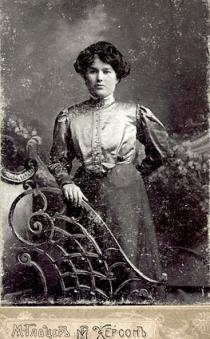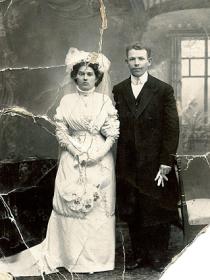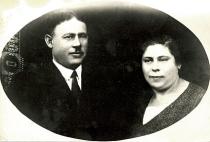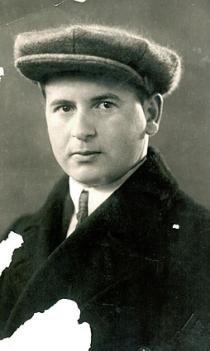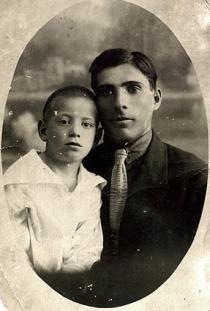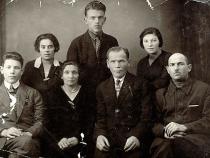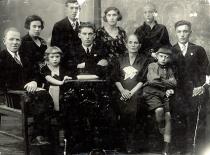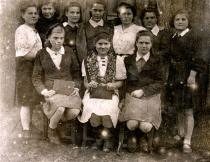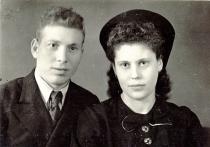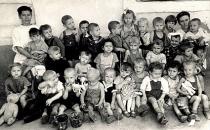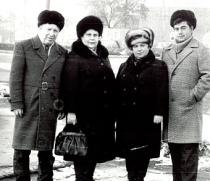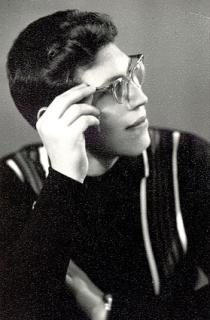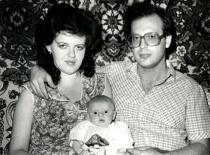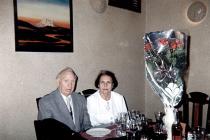My parents Isrul and Esther Rukinglaz photographed on their wedding day in a photo shop in Kherson in 1910. They are very beautiful: my father has fair curly hair. My mother is a black-haired and black-eyed beauty. They are nicely dressed: my father is wearing a nice 3-piece suit and my mother is wearing a snow-white gown and has a purse.
My father Israel Rukinglaz was born in 1881. My father told me that he had fair hair, when a child. He looked like grandfather Zelik. At the age of 4 my father went to cheder where he got a Jewish education, and his educational course ended, when he turned 10 years old. My father became an apprentice of a popular tailor in Kherson. My father happened to be a gifted apprentice, and soon he began to assist the tailor. When he turned 15, he already had his own clientele. My father designed and made clothes. At the age of 16 he made a coat for the wife of Kherson governor, and from then on the town's elite ordered their clothes from him. My father made men's and women's clothes. On Saturday my father sang at the synagogue of craftsmen: he had a strong voice and good ear.
In the early 20th century, when the revolutionary ideas seized over workers and craftsmen, my father also joined the advanced proletariat. Though he earned well and was not poor, he was attracted like many other Jewish young people by the ideas of equality and fraternity of all people propagated by the Bolsheviks. In 1905 there were riots in Kherson. My father organized and headed a riot of craftsmen. Fortunately for him, he didn’t suffer during this period. After 1905 my father continued his work as a tailor. He didn’t join the Bolshevik Party, but he didn’t give up his revolutionary convictions. My father was a very good designer and was awarded the title of Hero of Labor; I remember the ribbon with the award pinned to it.
My mother Esther was born in 1888. She received an elementary Jewish education. She studied 4 years in a Jewish school. My mother could read and write in Yiddish, knew prayers in Hebrew and could read the Torah a little. She told me that grandfather Leizer taught her Hebrew and prayers. My mother was a sickly child and her parents didn't train her in any crafts. She was helping my grandmother about the house. My parents got married in 1910. I often look at their wedding photograph made in one of best photo shops in Kherson. They are wearing rich fancy clothes. They had a traditional Jewish wedding according to all rules: they stood under the chuppah in the biggest and most beautiful synagogue of the town.
After the wedding my parents rented an apartment in a house in Spartakovskaya Street near the market in the center of the town. In 1911 my mother gave birth to twins, but they died in infancy. My mother didn't have children for few years. She fell ill with tuberculosis. At that time WWI began. Fortunately, my father had a 'white card' [Editor's note: this was a release from service in the tsarist army before the revolution of 1917 issued by a medical commission that determined whether a young man was fit for military service], due to his poor sight. However, this didn't prevent him from working from dawn till night: my mother needed lots of medications and my father had to earn well to pay for them. Since my father made clothes for the town leadership, he managed to have my mother taken to a good hospital and she had all necessary medications that enabled her to set on her way to recovery.

